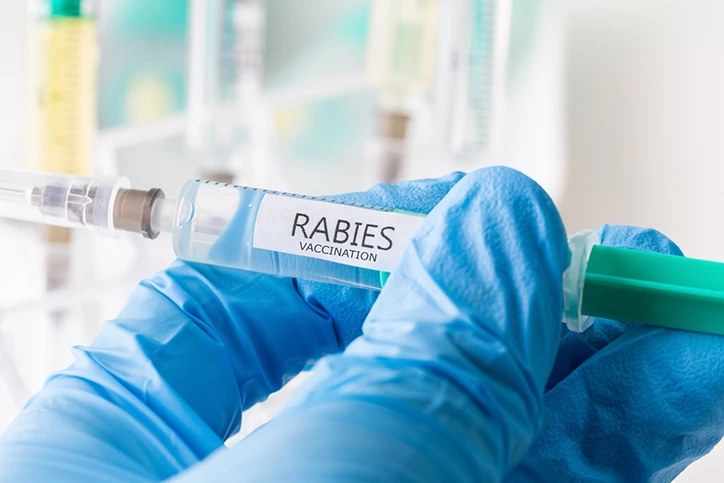Our thoughts are with the family of Yvonne Ford who recently died of rabies following a scratch from a puppy while on holiday in Morocco in February.
What is rabies?
Rabies is a fatal but vaccine preventable viral disease, with an incubation period between three and twelve weeks but may range from one day to 19 years.
Early symptoms may include tingling around the site of the wound, fever, headache and tiredness, with death resulting from respiratory paralysis. Once the symptoms have started there is very little that can be done medically, except to keep you comfortable and this is why it is so very important to understand your risks when travelling to countries where rabies is endemic.
Immediate treatment following a potential exposure will save your life.
How do I know if I am at risk of rabies?
Rabies in animals occurs in all continents except Antarctica, with some individual countries and Islands reporting to be rabies-free. Did you know that if you are bitten by a Bat in the UK, USA or Australia that you should seek advice on post exposure treatment for rabies?
Before travelling it is important to be aware of the risks within the country you are visiting and understand how to reduce your risks and what action you should take if bitten, scratched or licked over an open cut by an infected animal. At Masta when you log onto our website you can select the country or countries that you are travelling to, and we will create a travel health brief which explains your risks and the vaccines that are available to help keep you safe when travelling. When you book into one of our specialist clinics or with one of our tele-consult nurses, we will explain these risks and inform you which vaccinations are required, recommended or to be considered.
How is rabies transmitted?
Infection is usually from the bite or scratch of a rabid animal, with dogs contributing up to 99% of rabies transmissions to humans. You may not be aware that the animal is infected as it may not yet display classic symptoms. It could be a cute puppy or a kitten. All exposures should be treated as potentially infectious.
- A bite or a scratch, no matter how small has the potential to transfer the virus.
- A lick over an open cut or scratch or if the saliva of the infected animal comes into direct contact with your mucosa:- eyes, mouth, there is a potential for transmission of the virus.
- Infection does not occur through intact skin, but you still need to start your first aid prevention.
Prevention & Treatment.
Keep away from animals when travelling. Running and cycling are both considered high risk activities so do be cautious. Domestic and wild animals can carry the virus, and I remember with sadness, a consultation that I had with a young man travelling home to the funeral of his mother in India following a scratch from the new kitten they had adopted.
There are two rabies vaccinations licensed for use in the UK, and these are given usually on day 0, day 7 and day 21 prior to your departure. If you don’t have enough time to complete this schedule there is a more rapid schedule given on day 0, day 3 and day 7 with a 4th dose in 1 year. Receiving the vaccination prior to departure will prime your system so that it is ready to respond quickly to two booster doses if you do have a potential rabies exposure.
Should you decide to travel without the vaccination, and have a potential rabies exposure, you may require immunoglobulin to be injected into and around the wound site and an additional 4 or 5 Rabies vaccinations over the next 4 weeks. It is very important to recognise that in endemic countries there may be shortages of vaccine, and you may have to travel to another country to get the correct treatment.
People who are immunosuppressed should seek individual advice from a travel health expert.
It is never too late to seek advice following an exposure to the rabies virus. If you have been bitten or scratched by an animal on any of your trips away and did not seek medical attention at the time, please do speak with your GP and ask them to contact the UK health Security Agency for advice on post exposure rabies. Remember the virus can hibernate for many years and once you get symptoms it is too late for treatment.
First aid following exposure.
If you are bitten, scratched or licked by an animal when travelling, it is very important to know what to do immediately to reduce your risk of exposure to the deadly virus.
- Wash the area under a running tap, with soap, for 15 minutes.
- Apply a suitable disinfectant, containing 40 to 70% alcohol and cover the wound with a simple dressing.
- Primary suturing could cause further damage to the wound and may increase the risk of introduction of rabies virus to the nerves. It should be avoided or postponed until post exposure treatment has commenced.
- Bites on the head, neck, face, hands, and genitals are considered a very high risk because of the easy access for the virus to enter the nervous system from these areas and should be treated as a medical emergency.
- Go to the local medical centre immediately for competent and comprehensive advice immediately after the incident. Do not wait till you come home, even if you are travelling on the same day as the incident.
- Contact your insurance advisor for help and advice.
- Do not ignore minor scratches.
Take home message:
- Rabies is a fatal but vaccine preventable viral disease.
- Spread through a bite, scratch or lick from an infected animal.
- The saliva is infected, if you get saliva in your mouth or eyes you could be infected.
- You will not know if an animal is infectious so keep away from animals.
- Take immediate first aid action if exposed and seek medical help on the day.
- Be aware of your surroundings and that your actions may attract unwanted attention from animals.
- It is never too late to seek post exposure advice from your GP
Travel safely and know your risks before travel. Book a consultation with one of our travel health experts today and know how to protect yourself.
References:
Health Security Agency. 2023. Rabies. The Green Book Chapter 27. Online. Available at: Guidance overview: Rabies: the green book, chapter 27 – GOV.UK (www.gov.uk) (Accessed 19 June 2025)
Health Security Agency. 2024. Rabies Post Exposure Treatment and Management Guidelines Online. Available at: https://www.gov.uk/government/publications/rabies-post-exposure-prophylaxis-management-guidelines (Accessed 19 June 2025)





